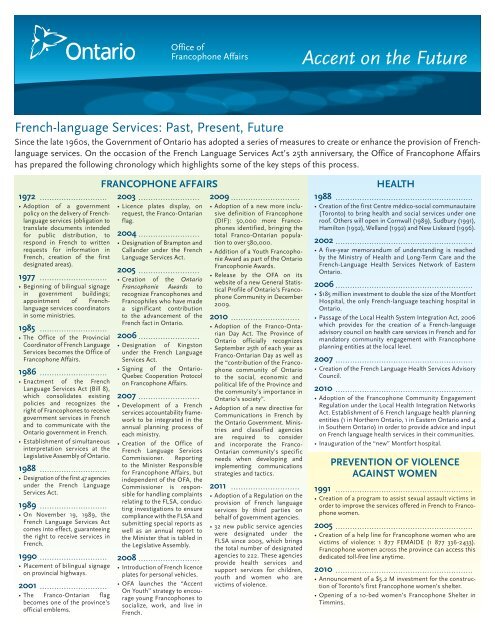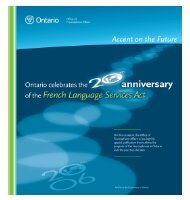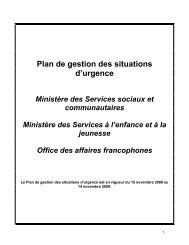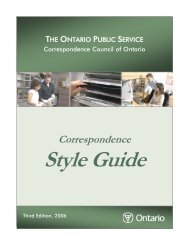PDF Version - Office des affaires francophones - Ontario
PDF Version - Office des affaires francophones - Ontario
PDF Version - Office des affaires francophones - Ontario
Create successful ePaper yourself
Turn your PDF publications into a flip-book with our unique Google optimized e-Paper software.
<strong>Office</strong> of<br />
Francophone Affairs<br />
Accent on the Future<br />
French-language Services: Past, Present, Future<br />
Since the late 1960s, the Government of <strong>Ontario</strong> has adopted a series of measures to create or enhance the provision of Frenchlanguage<br />
services. On the occasion of the French Language Services Act’s 25th anniversary, the <strong>Office</strong> of Francophone Affairs<br />
has prepared the following chronology which highlights some of the key steps of this process.<br />
1972<br />
• Adoption of a government<br />
policy on the delivery of Frenchlanguage<br />
services (obligation to<br />
translate documents intended<br />
for public distribution, to<br />
respond in French to written<br />
requests for information in<br />
French, creation of the first<br />
<strong>des</strong>ignated areas).<br />
1977<br />
• Beginning of bilingual signage<br />
in government buildings;<br />
appointment of Frenchlanguage<br />
services coordinators<br />
in some ministries.<br />
1985<br />
• The <strong>Office</strong> of the Provincial<br />
Coordinator of French Language<br />
Services becomes the <strong>Office</strong> of<br />
Francophone Affairs.<br />
1986<br />
• Enactment of the French<br />
Language Services Act (Bill 8),<br />
which consolidates existing<br />
policies and recognizes the<br />
right of Francophones to receive<br />
government services in French<br />
and to communicate with the<br />
<strong>Ontario</strong> government in French.<br />
• Establishment of simultaneous<br />
interpretation services at the<br />
Legislative Assembly of <strong>Ontario</strong>.<br />
1988<br />
• Designation of the first 47 agencies<br />
under the French Language<br />
Services Act.<br />
1989<br />
• On November 19, 1989, the<br />
French Language Services Act<br />
comes into effect, guaranteeing<br />
the right to receive services in<br />
French.<br />
1990<br />
• Placement of bilingual signage<br />
on provincial highways.<br />
2001<br />
• The Franco-Ontarian flag<br />
becomes one of the province’s<br />
official emblems.<br />
FRANCOPHONE AFFAIRS<br />
2003<br />
• Licence plates display, on<br />
request, the Franco-Ontarian<br />
flag.<br />
2004<br />
• Designation of Brampton and<br />
Callander under the French<br />
Language Services Act.<br />
2005<br />
• Creation of the <strong>Ontario</strong><br />
Francophonie Awards to<br />
recognize Francophones and<br />
Francophiles who have made<br />
a significant contribution<br />
to the advancement of the<br />
French fact in <strong>Ontario</strong>.<br />
2006<br />
• Designation of Kingston<br />
under the French Language<br />
Services Act.<br />
• Signing of the <strong>Ontario</strong>-<br />
Quebec Cooperation Protocol<br />
on Francophone Affairs.<br />
2007<br />
• Development of a French<br />
services accountability framework<br />
to be integrated in the<br />
annual planning process of<br />
each ministry.<br />
• Creation of the <strong>Office</strong> of<br />
French Language Services<br />
Commissioner. Reporting<br />
to the Minister Responsible<br />
for Francophone Affairs, but<br />
independent of the OFA, the<br />
Commissioner is responsible<br />
for handling complaints<br />
relating to the FLSA, conducting<br />
investigations to ensure<br />
compliance with the FLSA and<br />
submitting special reports as<br />
well as an annual report to<br />
the Minister that is tabled in<br />
the Legislative Assembly.<br />
2008<br />
• Introduction of French licence<br />
plates for personal vehicles.<br />
• OFA launches the “Accent<br />
On Youth” strategy to encourage<br />
young Francophones to<br />
socialize, work, and live in<br />
French.<br />
2009<br />
• Adoption of a new more inclusive<br />
definition of Francophone<br />
(DIF): 50,000 more Francophones<br />
identified, bringing the<br />
total Franco-Ontarian population<br />
to over 580,000.<br />
• Addition of a Youth Francophonie<br />
Award as part of the <strong>Ontario</strong><br />
Francophonie Awards.<br />
• Release by the OFA on its<br />
website of a new General Statistical<br />
Profile of <strong>Ontario</strong>’s Francophone<br />
Community in December<br />
2009.<br />
2010<br />
• Adoption of the Franco-Ontarian<br />
Day Act. The Province of<br />
<strong>Ontario</strong> officially recognizes<br />
September 25th of each year as<br />
Franco-Ontarian Day as well as<br />
the “contribution of the Francophone<br />
community of <strong>Ontario</strong><br />
to the social, economic and<br />
political life of the Province and<br />
the community’s importance in<br />
<strong>Ontario</strong>’s society”.<br />
• Adoption of a new directive for<br />
Communications in French by<br />
the <strong>Ontario</strong> Government. Ministries<br />
and classified agencies<br />
are required to consider<br />
and incorporate the Franco-<br />
Ontarian community’s specific<br />
needs when developing and<br />
implementing communications<br />
stra tegies and tactics.<br />
2011<br />
• Adoption of a Regulation on the<br />
provision of French language<br />
services by third parties on<br />
behalf of government agencies.<br />
• 32 new public service agencies<br />
were <strong>des</strong>ignated under the<br />
FLSA since 2003, which brings<br />
the total number of <strong>des</strong>ignated<br />
agencies to 222. These agencies<br />
provide health services and<br />
support services for children,<br />
youth and women who are<br />
victims of violence.<br />
HEALTH<br />
1988<br />
• Creation of the first Centre médico-social communautaire<br />
(Toronto) to bring health and social services under one<br />
roof. Others will open in Cornwall (1989), Sudbury (1991),<br />
Hamilton (1992), Welland (1992) and New Liskeard (1996).<br />
2002<br />
• A five-year memorandum of understanding is reached<br />
by the Ministry of Health and Long-Term Care and the<br />
French-Language Health Services Network of Eastern<br />
<strong>Ontario</strong>.<br />
2006<br />
• $185 million investment to double the size of the Montfort<br />
Hospital, the only French-language teaching hospital in<br />
<strong>Ontario</strong>.<br />
• Passage of the Local Health System Integration Act, 2006<br />
which provi<strong>des</strong> for the creation of a French-language<br />
advisory council on health care services in French and for<br />
mandatory community engagement with Francophone<br />
planning entities at the local level.<br />
2007<br />
• Creation of the French Language Health Services Advisory<br />
Council.<br />
2010<br />
• Adoption of the Francophone Community Engagement<br />
Regulation under the Local Health Integration Networks<br />
Act. Establishment of 6 French language health planning<br />
entities (1 in Northern <strong>Ontario</strong>, 1 in Eastern <strong>Ontario</strong> and 4<br />
in Southern <strong>Ontario</strong>) in order to provide advice and input<br />
on French language health services in their communities.<br />
• Inauguration of the “new” Montfort hospital.<br />
PREVENTION OF VIOLENCE<br />
AGAINST WOMEN<br />
1991<br />
• Creation of a program to assist sexual assault victims in<br />
order to improve the services offered in French to Francophone<br />
women.<br />
2005<br />
• Creation of a help line for Francophone women who are<br />
victims of violence: 1 877 FEMAIDE (1 877 336-2433).<br />
Francophone women across the province can access this<br />
dedicated toll-free line anytime.<br />
2010<br />
• Announcement of a $5.2 M investment for the construction<br />
of Toronto’s first Francophone women’s shelter.<br />
• Opening of a 10-bed women’s Francophone Shelter in<br />
Timmins.
<strong>Office</strong> of<br />
Francophone Affairs<br />
Accent on the Future<br />
1968<br />
• Official recognition of Frenchlanguage<br />
elementary schools;<br />
authorization to create Frenchlanguage<br />
sections at the secondary<br />
level.<br />
• Creation of French-language<br />
advisory committees within school<br />
boards.<br />
1979<br />
• School boards are required to<br />
establish French-language classes,<br />
sections or schools where numbers<br />
warrant.<br />
1984<br />
• Recognition of the right of Francophones<br />
to receive an education in<br />
French at the elementary and secondary<br />
levels and removal of the “where<br />
numbers warrant” requirement.<br />
1986<br />
• Enactment of legislation on school<br />
governance giving Francophones<br />
exclusive control of French-language<br />
schools and sections.<br />
1988<br />
• Creation of French-language<br />
community literacy centres.<br />
1990<br />
• Opening of <strong>Ontario</strong>’s first Frenchlanguage<br />
college of applied arts and<br />
technology, La Cité collégiale, in<br />
Ottawa.<br />
1995<br />
• Opening of Collège Boréal in<br />
Sudbury.<br />
1979<br />
• Recognition of the right of<br />
Francophones to criminal<br />
proceedings in French in<br />
<strong>Ontario</strong>.<br />
1984<br />
• Enactment of the Courts of<br />
Justice Act, giving French and<br />
English official language status<br />
in <strong>Ontario</strong>’s court system.<br />
1991<br />
• The Revised Statutes of <strong>Ontario</strong><br />
are published in French.<br />
1993<br />
• Designation of the first two<br />
French-language legal clinic<br />
under the French Language<br />
Services Act (one in Stormont-<br />
Dundas-Glengarry and the<br />
other in Prescott-Russell).<br />
EDUCATION<br />
1997<br />
• Creation of 12 French-language school<br />
boards (4 public and 8 catholic).<br />
2000<br />
• Creation by the 12 French-language school<br />
boards of the SAMFO project, a multimedia<br />
and e-learning initiative <strong>des</strong>igned<br />
to compensate for the geographic and<br />
demographic dispersion of the Francophone<br />
school population in <strong>Ontario</strong> by<br />
ensuring access to more courses at the<br />
secondary level.<br />
2006<br />
• The growing number of French-language<br />
schools gives rights holders increased<br />
access to French-language education<br />
across the province.<br />
• Launch of the Politique d’aménagement<br />
linguistique de l’<strong>Ontario</strong>, a language<br />
planning policy to promote the French<br />
language and culture, improve student<br />
achievement, and help keep young Franco-<br />
Ontarians in French-language schools.<br />
• Creation of an advisory committee on<br />
French-language postsecondary education.<br />
• Establishment of a permanent Elementary<br />
and Secondary French-Language Education<br />
Task-Force.<br />
2009<br />
• New Aménagement Linguistique Policy<br />
whose goal is to help the province’s Frenchlanguage<br />
educational institutions and<br />
settings optimize the transmission of the<br />
French language and culture among young<br />
people, to help them reach their full potential<br />
in school and society, and to breathe<br />
new life into the francophone community.<br />
JUSTICE<br />
1998<br />
• Enactment of the Legal Aid<br />
Services Act, 1998, resulting in the<br />
creation of Legal Aid <strong>Ontario</strong>/Aide<br />
juridique <strong>Ontario</strong>, an independent<br />
government funded agency<br />
subject to the French Language<br />
Services Act.<br />
2000<br />
• Creation of a Forum between<br />
francophone stakeholders and<br />
senior managers from the justice<br />
sector in order to work together to<br />
improve French language services<br />
in the justice sector.<br />
2002<br />
• Memorandum of understanding to<br />
open the first Francophone legal<br />
aid clinic in Toronto, followed by<br />
the Ottawa clinic in 2003.<br />
2010<br />
• Creation of 266 new child-care<br />
spaces in French language schools.<br />
2003-2011<br />
• Additional investments of $562<br />
million in the French-language<br />
education system, at the elementary<br />
and secondary level, since<br />
2003; an increase in per pupil<br />
funding of over 69%. The total<br />
funding for French-language<br />
boards for the 2010-11 school year<br />
was $1.24 billion, the largest investment<br />
in French Language education<br />
in the history of the province.<br />
2011<br />
• <strong>Ontario</strong> puts in place a Frenchlanguage<br />
policy framework for<br />
postsecondary education and<br />
training. The goal is to help provide<br />
Ontarians with more opportunities<br />
to study and train in French.<br />
• Substantial additional investments<br />
in infrastructure in the primary,<br />
secondary and postsecondary<br />
francophone educational sectors:<br />
- $248.9 million worth of construction<br />
was undertaken under<br />
the French Capital Transitional<br />
Funding component of the Grant<br />
for New Pupil Places in the<br />
primary and secondary school<br />
systems.<br />
- $84.8 million was invested in the<br />
postsecondary sector as well as in<br />
training for Francophones.<br />
2003<br />
• Launch of the first <strong>Ontario</strong> Provincial Police<br />
Strategy for the Delivery of French Language<br />
Services.<br />
2004<br />
• Creation of a French Language Institute for<br />
Professional Development through which<br />
professionals in the justice system can increase<br />
their French-language abilities.<br />
2006-2011<br />
• Implementation of the first phase of the Strategic<br />
Plan for the Development of French Language<br />
Services in <strong>Ontario</strong>’s Justice Sector, in partnership<br />
with the francophone stakeholders, which aims<br />
to improve, modernize and expand access to<br />
French Language Services in the justice sector.<br />
2011-2015<br />
• Renewal of the Strategic Plan (Phase 2): Evolution<br />
of French Language Services in <strong>Ontario</strong>’s<br />
Justice Sector.<br />
CULTURE AND<br />
COMMUNICATIONS<br />
1969<br />
• Creation of a Franco-Ontarian <strong>Office</strong><br />
of the <strong>Ontario</strong> Arts Council and of a<br />
French-language section at TV<strong>Ontario</strong>.<br />
1987<br />
• TV<strong>Ontario</strong>’s La Chaîne française, now<br />
known as TFO, begins broadcasting.<br />
1993<br />
• The first Salon du livre de Toronto is<br />
held in October 1993, with the support<br />
of <strong>Ontario</strong> ministries.<br />
1994<br />
• Creation of the Prix Trillium, an annual<br />
award for <strong>Ontario</strong>’s Francophone<br />
writers.<br />
2006<br />
• Establishment of an improvement<br />
program for French-language, rural,<br />
Northern, and First Nations libraries.<br />
2007<br />
• The OFA, in collaboration with the<br />
Regroupement <strong>des</strong> organismes du patrimoine<br />
franco-ontarien, launches the<br />
travelling exhibition <strong>Ontario</strong>’s Francophonie:<br />
Then and Now.<br />
2008<br />
• TFO becomes an independent and<br />
self-governing organization with its<br />
own budgets, its own board of directors<br />
and its own offices.<br />
2010<br />
• Official launch of TFO in Manitoba.<br />
• The Ministry of Tourism and Culture<br />
launches two three-year pilot programs<br />
to address the needs of Francophone<br />
visual artists, arts organizations and<br />
collectives in <strong>Ontario</strong>.<br />
MUNICIPALITIES<br />
2006<br />
• Creation of a website, Centre d’archives<br />
<strong>des</strong> règlements municipaux, which<br />
provi<strong>des</strong> the English and French<br />
versions of municipal by-laws.<br />
2009<br />
• As part of the province’s Accent on<br />
Youth Strategy, launch of a new initiative<br />
developed by the OFA in partnership<br />
with the Association française <strong>des</strong><br />
municipalités de l’<strong>Ontario</strong> (AFMO)<br />
– which aims to encourage young<br />
Francophones to learn more about<br />
municipal affairs.<br />
© Queen’s Printer for <strong>Ontario</strong>, 2011






